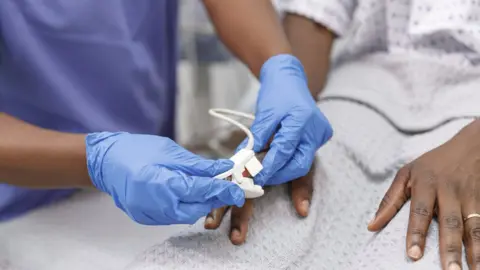NI health: Trusts cancelling operations amid hospital pressures
 Getty/Morsa Images
Getty/Morsa ImagesMost of Northern Ireland's health trusts have confirmed they are starting to cancel non-urgent operations due to ongoing hospital pressures.
All trusts, except Belfast, have said they are taking the action to increase bed capacity for unscheduled admissions.
It comes after reports of delays of many hours in ambulances offloading patients to emergency departments.
Health authorities have forecast the pressure is set to continue.
The Belfast Health Trust said it was unable to confirm numbers at this stage but would do so in the next 24 hours.
The Western Trust said a small number of procedures have been postponed, including orthopaedic procedures.
Meanwhile, the South Eastern Trust said in order to avoid cancelling, it had planned ahead and instead had reduced the number of patients booked in for procedures during the winter months.
It added that given the unprecedented pressures, the trust may have to postpone some planned surgery and outpatient appointments at short notice.
It said that it is "continuing to make every effort to prioritise red flag urgent procedures".
Some elective orthopaedic surgery has been cancelled in the Southern Health Trust.
Unprecedented pressures
A spokesperson said the trust is reviewing the situation daily and is working hard to ensure all postponed patients are offered a new date.
A small number of non-red flag endoscopy and surgical procedures have also had to be postponed in the Northern Trust.
At this time of year, it is not unusual for health trusts to take this action.
The difference now is how long the measure will continue as these unprecedented pressures linger into Spring and possibly beyond.
 Getty Images
Getty ImagesEarlier on Thursday, a care home body said targets to move patients who are fit to leave hospital into care homes within 48 hours had improved the discharge process.
The measure was introduced by all five health trusts in December to ease Emergency Department (ED) pressures.
However, Pauline Shepherd, the chief executive of Independent Health and Care Providers (ICHP), said it was not a long-term solution.
She called for better funding of community and social care.
Ms Shepherd told the BBC's Good Morning Ulster programme : "What I'm gathering from our members is that yes, there have been care beds utilised and there's capacity being used.
"However, there are still pockets of capacity available."
Emergency department backlogs can often stem from not being able to admit people onto wards due to a lack of available beds.
Ms Shepherd said there had been an improvement in communication between hospitals and care home providers over the Christmas and new year period.
Under the measures, if hospital inpatients are medically fit their families can be asked to take them home if they can, or agree to admit them to the first suitable care home anywhere in Northern Ireland if they cannot go home.
Those who are discharged into care homes are put on a waiting list for care packages that will allow them ultimately to to be looked after in their own homes.
The Department of Health said hospitals across Northern Ireland continue to face "unprecedented pressures".
People have been urged to access services that are "most appropriate for your symptoms" in order to reduce pressure on emergency departments.
Waiting time targets
Meanwhile, latest figures show that all waiting time targets in Northern Ireland for patients accessing cancer services at hospitals have been missed again.
In the three months to September 2022, 63.2% of urgent referrals for breast cancer were seen within 14 days.
The target is that all patients should be seen within that time.
Less than half of patients (39.5%) received their first treatment within 62 days of an urgent GP referral.
The target is 95%.
The 31-day target of 98% of patients starting a first definitive treatment following a decision to treat was also missed.
Department of Health figures show 88.2% began their treatment within that timeframe.
That was slightly up on the previous quarter (86.2%), but down compared to the same time last year (90%).
In a statement, the department said it was "extremely disappointing" that its targets for cancer waiting times are not being met.
"The length of time patients in Northern Ireland were waiting for assessment, diagnosis and treatment for cancer was increasing before the pandemic and this has been exacerbated in the past three years," it said.
It added: "While measures to reduce waiting times have been of vital importance, it is acknowledged that a step change in cancer performance requires a significant investment in capacity, together with modernised care pathways underpinned by effective skills mix and use of technology.
"This will require substantial and sustained investment in workforce and services.
"However, in the absence of an agreed multi-year budget for health and a significant projected overspend for the year, the ability to strategically plan beyond 22/23 is extremely challenging."
